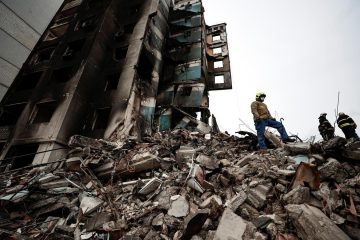Biden pushes for a diplomatic reaction to Iran’s assault on Israel

In an effort to prevent further military escalation between Iran and Israel, U.S. President Biden has announced his plan to convene leaders from the Group of Seven nations on Sunday. The goal is to coordinate a diplomatic response and avoid a wider regional conflict.
The attack further escalates the ongoing conflict that was sparked by the deadly raid conducted by militant group Hamas on Israel on October 7th. This incident signifies a heightened stage in the shadow war between Israel and Iran, a situation that the U.S. has been attempting to prevent.
Israel’s leaders were deliberating on how to address the surge of over 300 drones, cruise, and ballistic missiles launched by Iran. Israeli, American and other allied forces successfully intercepted most of the projectiles before they reached Israeli territory, and fortunately, no deaths have been reported. However, the significant scale of the direct attack on Israeli soil does raise concerns about the potential for further escalation.
Last week, Israeli Foreign Minister Israel Katz made it clear that his country is prepared to take action against Iran if they were to initiate an attack on Israeli territory. Katz confirmed the validity of that assertion during an interview with Israel’s Army Radio on Sunday.
According to Amos Yadlin, a former head of Israeli military intelligence and air force fighter pilot, it seems that Iran had intentions to overpower Israel’s defenses and cause significant damage to the important air base, Nevatim, which houses Israel’s fleet of F-35 fighter planes. According to Israel’s military, the base sustained only minimal damage.
When Israel has encountered rocket or missile barrages from Iranian proxies like Hamas in Gaza and Hezbollah in Lebanon, the Israeli military has consistently responded with speed and strength. Considering the potential consequences of triggering a larger conflict in the Middle East, it is probable that there will be coordination with the U.S. to determine the most appropriate course of action. According to Yadlin, Israel does have conflicting priorities.
According to Yadlin, it is undoubtedly in the interest of both the United States and Israel to attempt to de-escalate the conflict in the Middle East. Nevertheless, prioritizing the deterrence of Iran and the repercussions for Israel takes precedence.
In a letter to the United Nations, Iran stated that its attack was a response to airstrikes that it believed were carried out by Israel. Iran claimed that these airstrikes resulted in the deaths of Iranian military personnel at a diplomatic facility in Syria. Israel has not provided any statements regarding the attack in Syria.
Iran announced on Sunday that it has no further intentions of taking action against Israel. However, the Islamic Revolutionary Guard Corps has made it clear that it will respond to any country in the region, including the U.S., that supports Israel in retaliating against Tehran. According to U.S. officials, Iran’s missile capabilities are still significant, with an estimated arsenal of over 3,000 domestically produced missiles.
In a recent conversation, President Biden emphasized the unwavering dedication of the United States to Israel’s security. The White House also stated that the President intends to collaborate with G-7 nations to establish a cohesive diplomatic approach.
In preparation for Saturday’s attacks, the U.S. military strategically relocated aircraft and missile-defense resources to the region. They successfully intercepted numerous missiles and drones that were en route to Israel from Iran, Iraq, Syria, and Yemen.
Israel has a comprehensive aerial defense system that has been developed in collaboration with the United States to effectively handle attacks from various distances. The most renowned system in its arsenal is Iron Dome, which effectively intercepts rockets and missiles of shorter range. However, the military has also made significant advancements in technology to counter drones and long-range ballistic missiles that can reach beyond the earth’s atmosphere.
Israel successfully intercepted approximately 170 drones and over 30 cruise missiles with the use of antimissile systems and jet fighters, according to the Israeli military. According to reports, a small number of ballistic missiles, out of the total fired by Iran, managed to reach Israeli territory.
In total, Israel has reported that its military and allies successfully intercepted 99% of Iran’s drones and missiles. However, the country continues to maintain a state of vigilance.
“We intercepted.” We encountered an obstacle. “Together we will succeed,” Netanyahu posted on X on Sunday morning.
Israel and Iran have been engaged in indirect conflicts for many years, primarily through Tehran-backed proxies like Hamas and Hezbollah. However, the recent direct aerial assault marks a significant shift in the situation.
According to Mohanad Hage Ali, deputy director at the Malcolm H. Kerr Carnegie Middle East Center in Beirut, the U.S. might consider urging Israel to refrain from retaliating, considering the relatively low number of casualties and minimal damage caused by the attacks.
According to Hage Ali, there have been occasional clashes between Israel and Hezbollah during the Gaza war. However, both Iran and Hezbollah have indicated that they do not want to escalate the conflict beyond the Palestinian territory.
According to Hage Ali, there were clear indications in the days leading up to the Iranian aerial assault. He described the attack as being more of a theatrical display rather than a surprise attack intended to cause significant damage and casualties.
According to an expert, it appears that none of the involved parties – Iran, Hezbollah, and the U.S. – have any intention of escalating the situation into a regional conflict. Therefore, it is likely that the consequences will be limited.
As the attack commenced, air-raid sirens blared across Israel in the early hours of Sunday morning, encompassing Jerusalem and the southern regions of the country. There were also sirens activated in the West Bank.
A young child was seriously wounded by shrapnel, according to the Israeli military, while health authorities reported that others sustained minor injuries either from shrapnel or while rushing to air-raid shelters.
Israel announced the reopening of its airspace at 7:30 a.m. local time on Sunday, indicating a reduced likelihood of significant aerial threats in the near future. Israelis also began to explore Jerusalem once the country lifted sheltering orders.

